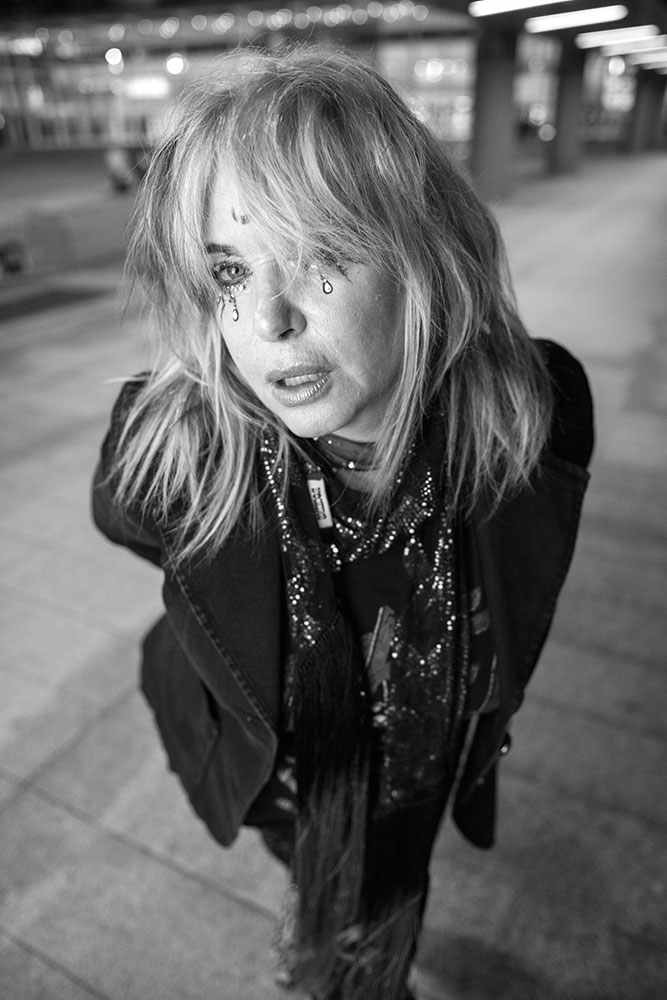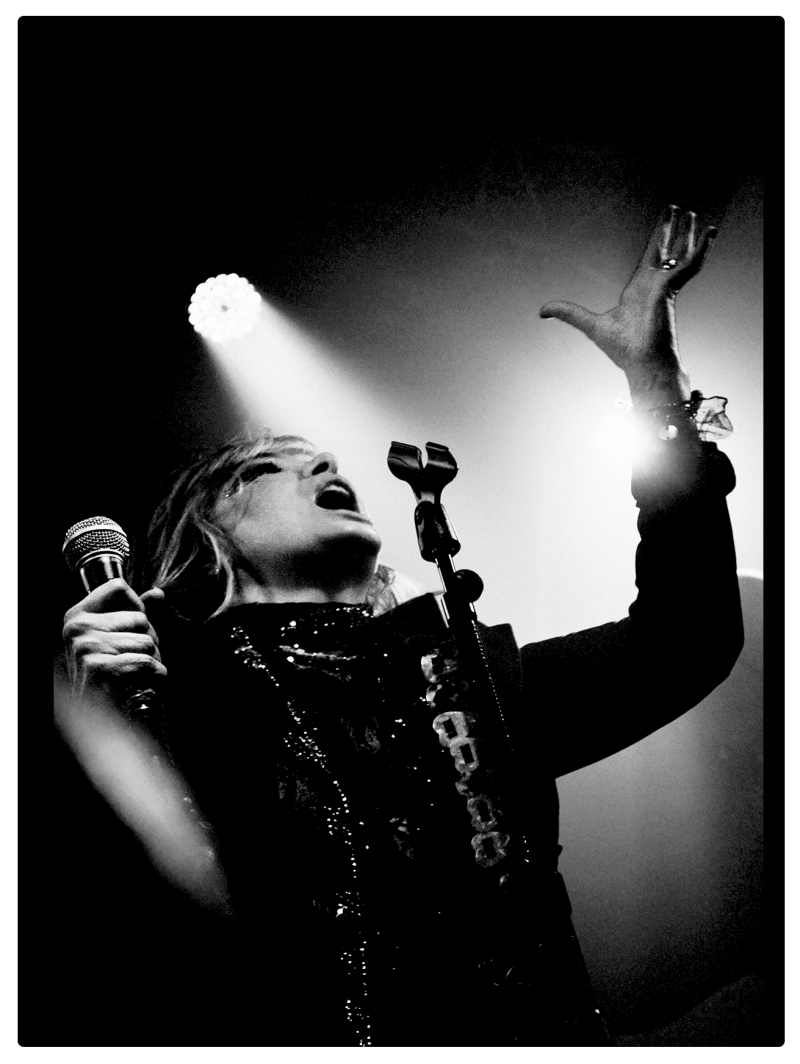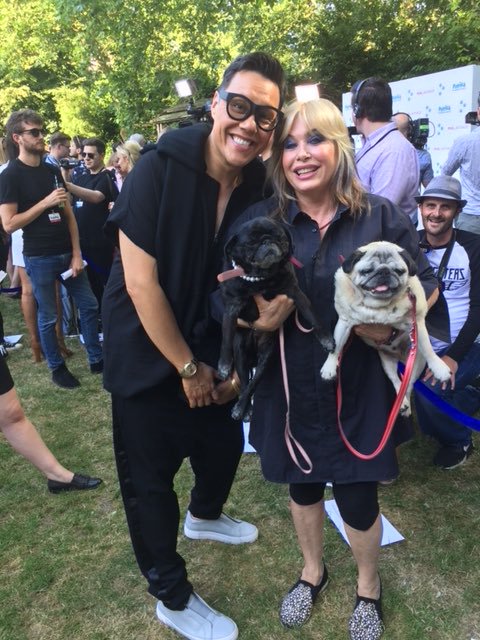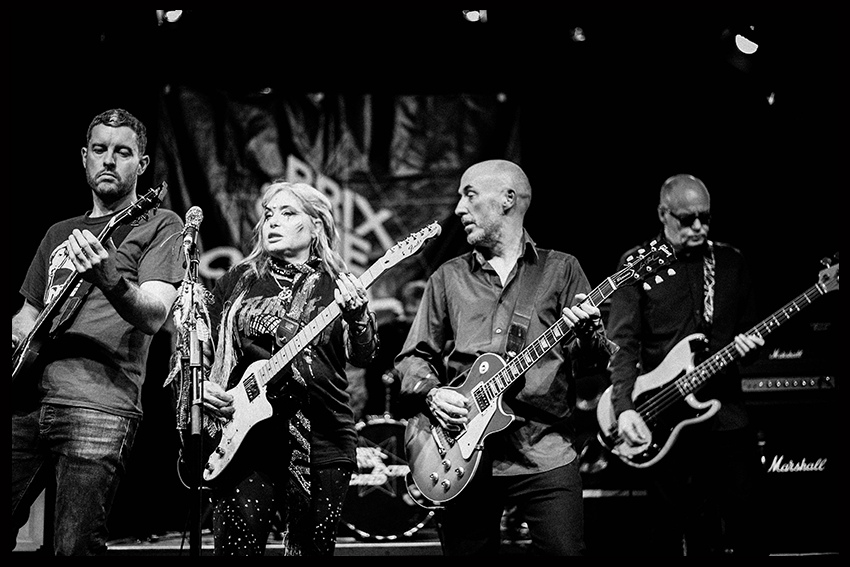Here’s the second instalment of my chat with Brix in October. The previous post focused on the new Extricated LP Super Blood Wolf Moon (which is available here) and how the creative process works for the band.
This time around we talk about London, the band’s relationship with the Fall’s legacy and the fashion industry.
Stuart: I recall from the book when you moved across London and all of your friends were in West London. I remember you said you went back to Holland Park to walk your dogs.
Brix: Every Sunday.
Stuart: You moved here (to Shoreditch) in 1999. It’s obviously changed immeasurably. Does the area feel like home still?
Brix: Well we’re a little away from the hustle and bustle. There are times when I go into Shoreditch and I despair. I’ll try never to go in on a Saturday night because it’s disgusting. There’s bad energy on the streets – drunk, drugs, but in a sad way. People desperate for a good time. It’s aggressive. I’m sensitive to energy. I don’t know if I’m on the spectrum but I don’t like people touching me or kissing me, like strangers. I twitch if someone is on the bus and come near me. This has gotten worse as I’ve gotten older. I’m more tuned to other people’s energy. It’s weird but it probably makes me a better writer.
Stuart: I’ve seen it as I have a wander to Rough Trade on a Saturday afternoon. There are hen and stag parties and they’ve heard there’s cool bars and cheap curries.
Brix: They’re just desperate to be cool but they’re empty inside. I’m not in love with it. At the same time, West London I find sanitised and soulless. Of course, there are beautiful things everywhere. I’m very happy where I am.

We then got to chatting about different parts of London. We discovered a mutual Muswell Hill connection. Her husband Phillip grew up there and went to the school with Rod Stewart, Ray and Dave Davies. This is the same school that my daughter attends. Phillip’s brother was the first drummer in the Kinks.
Brix: When I’m preparing for a tour, I immerse myself in our stuff to get the lyrics down. I put it on my Airpods and I listen to it over and over again I visualise and I use my body a lot to convey the lyrics. I sometimes work with a choreographer to convey what I want. Such as Dogface from the last album. I don’t care how freaky I look. I’m using my body as a physical extension of the music. Or Alaska when I would come out in the mask. It’s because the song is being about being trapped and vulnerable in an isolated cavern in Alaska during a blackout with a murderer in the house. It’s dark. The sum of all our fears. When you come out in front of an audience with a blindfold, it immediately makes you totally vulnerable and you’re trusting them. It puts them in a very open mind to be accepting of you. But I don’t listen to music when I’m preparing to tour or read books when I’m writing. I need to stay pure.
Stuart: Do you think there are more books there?
Brix: Yeah. There’s a novel that I’ve started and the next part of my book to cover what happened when I went back to music in my 50s. The whole changing of the playing field of the music. We haven’t had things handed to us because of our past. We’ve had to graft so hard. We have a fucking transit van, we stay in a Premier Inn if we can afford it. It’s hard but we’re doing it because we have a passion.

Stuart: I don’t see a perception of being the place.
Brix: People don’t know what it takes to get a tour together, to keep a band together.
Stuart: How do you deal with the geography with the band in the North West and you in London?
Brix: We’ve got the writing down. Whoever writes the music, they send it to me and we have the recipe where I do the lyrics and the melody, which is great. For the tours, I have to go up there for rehearsals, which is fine. I don’t mind that all. After the first record, we didn’t have a record company so I had to set up my own. How do make that work? How do you keep in profit? How do you keep the band on the road? Jason has a degree in economics, he’s like a forensic accountant. We figured out a business plan with the help of Donald Johnson from A Certain Ratio. It’s been really successful for us and we’ve always been in profit. We’re not going to buy a castle but we’re doing a lot better. We’ve bucked the system. We do have Cargo as our distributor. We need a proper distributor to get into place what we can’t. From our website, we make enough to finance the manufacturing and keep the band going. It’s one of the reasons that after every show we come out. We meet everybody and we sign everything. We’re grateful because without that and without social media, we wouldn’t be able to do this. The book will about all that. And people say “you’re never going to do it in your fifties. Who the fuck wants to know?”
Stuart: I think there’s a core audience that wants to keep the story going.
Brix: 100% but it’s also about the young ones that want authenticity or need a strong woman role model that doesn’t hardly exist. It’s all the young kids that I need to reach which we are. The demographic is completely different than with the fall. It started off with the dads that went to the Fall, the mums that watched me on Gok’s Fashion Fix and teenage kids getting turned onto it. We have this thing called #ExtricatedFamily. We have a bunch of families following us around the country. They do it as a family thing and we love that. Loads of gay men and gay women. Loads of transgender. I want to speak to all of them. All of us are marginalised in one way or another. This something that can unify everybody. it can bring sunshine to everybody in every way. It can bring strength. If I can do it, they can fucking do it.
woman role model that doesn’t hardly exist. It’s all the young kids that I need to reach which we are. The demographic is completely different than with the fall. It started off with the dads that went to the Fall, the mums that watched me on Gok’s Fashion Fix and teenage kids getting turned onto it. We have this thing called #ExtricatedFamily. We have a bunch of families following us around the country. They do it as a family thing and we love that. Loads of gay men and gay women. Loads of transgender. I want to speak to all of them. All of us are marginalised in one way or another. This something that can unify everybody. it can bring sunshine to everybody in every way. It can bring strength. If I can do it, they can fucking do it.
Stuart: An Extricated gig is fun and that isn’t always a given with every band.
Brix: The band are loving it and we’re up there and we’re totally connected and delivering. There’s no way that it can’t penetrate the audience. If you’re standing up there and you’re marking time to get your money. You’re on tour and you want to kill each other. It’s a different thing with this band. It’s tricky though when you’re pushed together. Everyone has their own needs and shit going on in their lives. My brother dying, that kid’s in the hospital. You put it all aside, you go up there and you just give a thousand per cent. It resonates with the audience.
Stuart: Not being your own tribute act helps as well. It’s lovely to hear LA or Totally Wired or whatever (I love playing them) but expecting to hear something that’s fresh is what keeps me coming back. I’m going to see a different dimension. I’m going to see something that I didn’t see last time.
Brix: We will put different Fall songs. We’ll rotate the Fall songs but we’ll always do it because it is part of us. But we are focussing on our stuff because that’s the future – the now.
Stuart: The first time that I saw the Fall was the From Manchester With Love concert in Liverpool with New Order and the Smiths (which I wrote about here). Do you remember that?
Brix: I remember being excited to do it. I remember understanding that Derek Hatton was the ultimate creep. He was so smarmy. He was false. I did it because I had to do it. I enjoyed playing with the Smiths and New Order. We toured with both of them in America. I’m sure we did a good show. We were on a trajectory going up and up. There was a time when we were on fire. Being in the Fall, you were actually in a trench the whole time. You were ducking and shielding from bombs and lethal weapons going off around you. Working with Mark Smith – he was my husband, I loved him. We were soul mates and we were incredible partners but he was not an easy guy to work with and it was always warfare. Not between me and him but he was complicated. So i would do whatever I had to do to get the job done. A lot of it meant erasing my memories. Not even acknowledging shit. Just powering through.
Stuart: What you are doing now seems not just to be reclaiming what you did in the Fall but adding to it.
Brix: For a long time I allowed Mark to take the credit for things I brought to the table because I was young and insecure. Because he was who he was. I was very happy and comfortable to take a co-pilot’s seat and not stand up and say “actually I did that”. I’m a co-creator. I’m a team player. I write a lot better with a partner. There was a lot that I wasn’t credited for, that people just assumed it was him because I kept my mouth shut and I didn’t say anything. Now they can look at what I’m doing and say “oh yeah, that would have been her hook. She would have done that”. It speaks for itself now and I’m really happy that I was able to reclaim because I was always meant to be doing what I’m doing not just be in the Fall but as a front person, as a lyricist, as a songwriter. It took me a while to get back to where I should have been. I was a bit broken and battered but I got there. I don’t need to go around screaming about it because it is there. It’s on fucking record forever.
Brix: We cannot change anybody but those that are awake and are conscious can band together and make a very strong movement to change which is what’s happening. I’m not actually fatalistic. I think everything’s going to be fine. We’re going to have to go through some dark times to get there. But there is no dark without light. People are waking up all the time and coming on board. There are some people, Phillip Green for example, that will never wake up. That is just going to be stuck, down here vibrating with dark energy, black smoke and cockroaches. Fear does not exist in the present moment only in the future or the past, which are not real. The future hasn’t happened, all of it is projection, we don’t know. We’re frightened of the future but it adds nothing. Or it is in the past, which has already happened so that’s not real either. Where are we now? We’re sitting at a table at a cute little cafe in Shoreditch, we’re healthy, we’re drinking wine. We have our teeth. We have families that love us. In this present moment, there is no fear. That’s what we need to remember to go through these things. Take it back to the moment and stop.
We then moved onto discussing clothes and fashion. Brix and her husband Phillip have been running successful boutiques in the Shoreditch area of London for the last twenty years. I have to confess a personal interest in this as a) I’m a bit of a clothes horse and b) my Mum used to have her own clothes shop back in Wolverhampton.

Brix: I didn’t realise that I had a photographic memory especially for colour. I didn’t realise that I had synesthesia. You close your eyes, you hear music and you see colour. I thought that was normal, that everyone had that. Everything makes a sound. Everything’s noisy. When I did the shop, I was amazing at advertising. The women’s store was covetable, it looked like a candy shop. The vibrations were working the same that I write music. It was the same thing. I didn’t know that but there was a woman called Sarah Mower who writes for Vogue who knows her stuff said: “how did you put that bag from Alexander Wang which was last season, matched exactly with Philip Lim which is this season?” I said, “I don’t know”. She said “Oh my god. You have a photographic memory for colour.” I was working with colour as a vibration, the same way that I work with music.

We were lucky enough to curate. I really loved doing the buying which was relentless. I could hook a collection – that, that, that. It was like picking a hit single. I knew what the winners were. We never had an investor so it was all our own money. Our neck was on the line the whole of the fucking time. At the same time, five times a week, I was doing a prime time hit TV show on Channel 4. Then I’d go buying at the weekends. For year’s I never took a need to take enough. You need to work in the shop to know what people were reacting to. It was all great. I just tried to deal with special clients, not everybody but I did need to be there as the staff were not as invested as you. Eventually, after the recession, there were people coming in who couldn’t afford it. I tried to get the price point lower so there were things that you could buy into without feeling excluded because it’s not nice to be excluded. It’s not nice to feel that you don’t have enough money or feel in some way diminished. So even if it was a £5 cool keyring just to have that. But then you had people who would come round who took my time like a vampire. I’m not a doctor. If I could take you in the changing room and give you liposuction and change your body, then I would. But what I can do is put you in a pair of jeans that minimises the part of you that you don’t like. I understood it.
In the end, it was like people were sticking needles in me and sucking my blood. I was done.
And we leave it there. Books are signed, selfies are taken. The Extricated are playing the Lexington in London on Saturday 30 November. It should be a special evening.
I need to make alternative plans to catch the band as unfortunately, I’ve got a prior engagement that evening as the wonderful up and coming Carpet have their first gig in the Smoke at the Spice of Life on the same evening.
